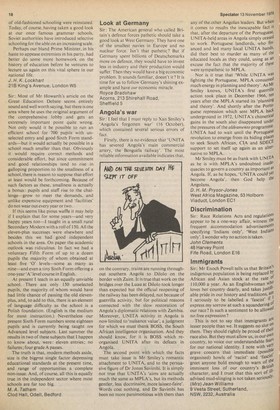Sir: Most of Mr Howarth's article on the Great Education
Debate seems entirely sound and well worth saying, but there is one area where he uses the original argument of the comprehensive lobby and gets an extremely important point quite wrong. Not only would it be possible to run an efficient school for 700 pupils with unselected entry and good Sixth Form standards—but it would actually be possible in a school much smaller than that. Obviously it would require correct methods and considerable effort, but since commitment and good relationships tend to rise in galloping proportion to the smallness of a school, there is reason to suppose that effort at least would be forthcoming. Because of such factors as these, smallness is actually a bonus: pupils and staff rise to the challenge—grow to meet the demands, and unlike expensive equipment and 'facilities' do not wear out every year or two.
If this seems like pious waffle it may help if I explain that for some years—and very happy years too-1 taught in a small rural Secondary Modern with a roll of 150. All the eleven-plus successes were elsewhere and besides this we had good independent schools in the area. On paper the academic outlook was ridiculous. In fact we had a voluntary Fifth Form of up to a dozen pupils the majority of whom obtained at least five '0' levels—some as many as nine—and even a tiny Sixth Form offering a one-year 'A' level course in English.
At present I teach in an equally unviable school. There are only 150 unselected pupils, the majority of whom would have had little chance of passing the old elevenplus, and, to add to this, there is an element of language difficulty as the school is a Polish foundation. (English is the medium for most instruction.) Nevertheless our present Sixth Form numbers some eighteen pupils and is currently being taught ten Advanced level subjects. Last summer the results in two of these subjects that I happen to know about, were: eleven entries; no failures; four grade A passes.
The truth is that, modern methods aside, size is the bigpf;st single factor depressing educational standards at the present time, and range of opportunities a complete non-issue. And, of course, all this is equally true in the independent sector where most schools are far too big. •
M. A. Tatham
Clod Hall, Odell, Bedford


































 Previous page
Previous page